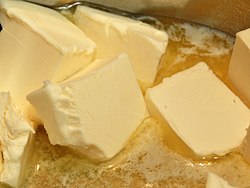Saturated fat and cardiovascular disease
| Not just a river in Egypt Denialism |
| Alternative facts |
| ♫ We're not listening ♫ |
Practically all medical, scientific, governmental, and professional health authorities agree that saturated fat is a significant risk factor for cardiovascular disease (CVD).[1][2][3][4]
Medical research has revealed that eating a diet high in saturated fat raises low-density lipoprotein (LDL or "bad") cholesterol in the blood which is linked to an increased risk of cardiovascular disease.[1][5][6][7] Decades of science have reinforced this link.[8]
The British Heart Foundation![]() notes that "the consensus among world-leading researchers is that too much saturated fat can increase the amount of cholesterol in your blood, which can increase your risk of developing coronary heart disease."[9] A Presidential Advisory From the American Heart Association in 2017 concluded: "Taking into consideration the totality of the scientific evidence, satisfying rigorous criteria for causality, we conclude strongly that lowering intake of saturated fat and replacing it with unsaturated fats, especially polyunsaturated fats, will lower the incidence of CVD."[10]
notes that "the consensus among world-leading researchers is that too much saturated fat can increase the amount of cholesterol in your blood, which can increase your risk of developing coronary heart disease."[9] A Presidential Advisory From the American Heart Association in 2017 concluded: "Taking into consideration the totality of the scientific evidence, satisfying rigorous criteria for causality, we conclude strongly that lowering intake of saturated fat and replacing it with unsaturated fats, especially polyunsaturated fats, will lower the incidence of CVD."[10]
Low-density lipoprotein receptors play a critical role in regulating the amount of cholesterol in the blood. Reducing saturated fat consumption is associated with an increase in LDL-receptor abundance.[11] A 2018 study found that saturated fat is more metabolically harmful for the liver than unsaturated fat.[12]
Modern denialists[edit]
You knew this was coming, didn't you, given the current popularity of idiot conspiracy theories?
Cholesterol denialists, low-carb, paleo diet and carnivore diet fanatics claim that there is no link between saturated fat consumption and increased blood cholesterol levels. They also claim that eating a massive amount of saturated fat is healthy and not a risk factor for cardiovascular disease. James DiNicolantonio, Aseem Malhotra, Joseph Mercola and Gary Taubes are recent examples of this kind of denialism.[13][14][15][16][17] Bruce Griffin, Professor of Nutritional Metabolism at the University of Surrey, stated that "to suggest that the theory relating saturated fat to increased total cholesterol is flawed, is nonsense, and contradicts 50 years of evidence-based medicine."[13]
But what about medium-chain saturated fats?[edit]
It's true that most studies on the dietary effects of saturated fat don't tend to distinguish between different types of saturated fats. Some are composed of long-chain saturated fatty acids, while others are made of medium-chain saturated fatty acids. It's also true that, in the case of coconut oil (half of whose saturated fats are medium-chain), there are a few studies suggesting that its medium-chain saturated fats may have health effects more akin to unsaturated fats than to long-chain saturated fats.[18][19]
But these effects are not well-studied yet. And most dietary saturated fats are long-chain, whose deleterious health effects are well studied. (Even coconut oil contains a whopping percentage of long-chain saturated fats.)
See also[edit]
External links[edit]
- How to eat less saturated fat — National Health Service.
- The Skinny on Saturated Fat — Science-Based Medicine.
References[edit]
- ↑ 1.0 1.1 Saturated Fat. Food and Drug Administration.
- ↑ Dietetic guidelines on food and nutrition in the secondary prevention of cardiovascular disease — evidence from systematic reviews of randomized controlled trials
- ↑ Dietary fats and dietary cholesterol for cardiovascular health. Heart Foundation.
- ↑ See the Saturated fat and cardiovascular disease
 for a bigger list.
for a bigger list.
- ↑ Watch: What does fat do and what is saturated fat?. British Heart Foundation.
- ↑ The Skinny on Fats. American Heart Association.
- ↑ Fats Explained. British Heart Foundation.
- ↑ Saturated Fat. American Heart Association.
- ↑ Saturated fat claims are misleading. British Heart Foundation.
- ↑ Sacks et al (2017). Dietary Fats and Cardiovascular Disease: A Presidential Advisory From the American Heart Association. Circulation 18: 136 (3): e1-e23.
- ↑ Mustad. (1997). Reducing saturated fat intake is associated with increased levels of LDL receptors on mononuclear cells in healthy men and women. J Lipid Res 38 (3): 459-468.
- ↑ Luukkonen et al (2018). Saturated Fat Is More Metabolically Harmful for the Human Liver Than Unsaturated Fat or Simple Sugars. Diabetes Care 41 (8): 1732-1739.
- ↑ 13.0 13.1 Saturated fat is not bad for health says heart expert. The Telegraph.
- ↑ Saturated Fat: The Forbidden Food You Should Never Stop Eating. Joseph Mercola.
- ↑ New Science Destroys the Saturated Fat Myth. Joseph Mercola.
- ↑ What’s Cholesterol Got to Do With It?. Gary Taubes.
- ↑ The Vindication of Cheese, Butter, and Full-Fat Milk. James Hamblin, The Atlantic.
- ↑ WebMD on coconut oil, page 2: A few studies showed that coconut oil may improve the ratio of total cholesterol to HDL cholesterol, but they also showed an increase in LDL cholesterol.
- ↑ Mensink et al., Effects of dietary fatty acids and carbohydrates on the ratio of serum total to HDL cholesterol and on serum lipids and apolipoproteins: a meta-analysis of 60 controlled trials., American Journal of Clinical Nutrition, vol. 77 no. 5 (May 2003), pp. 1146-55
